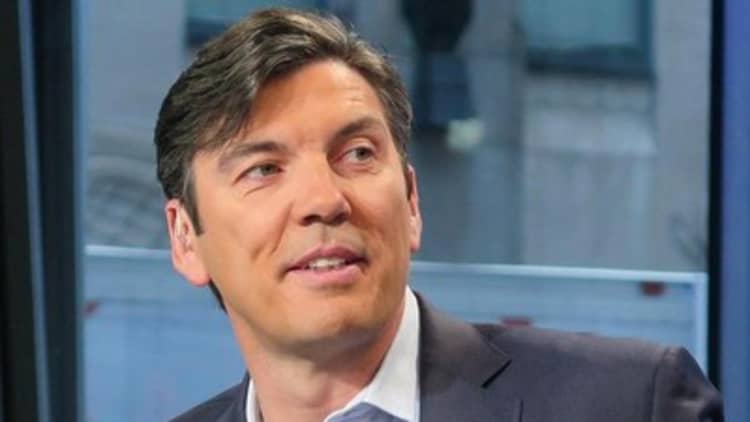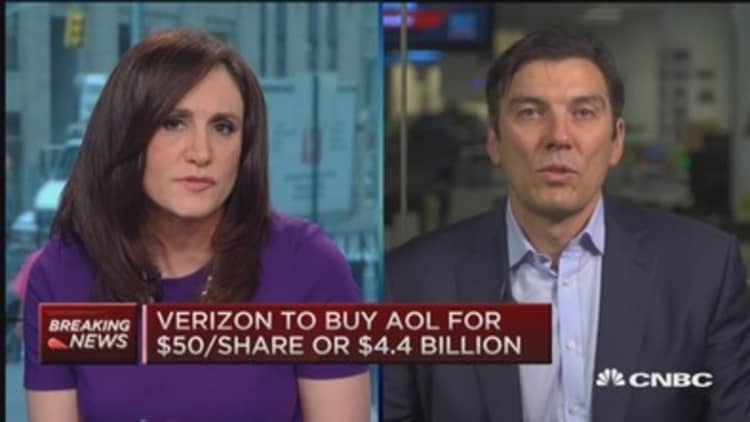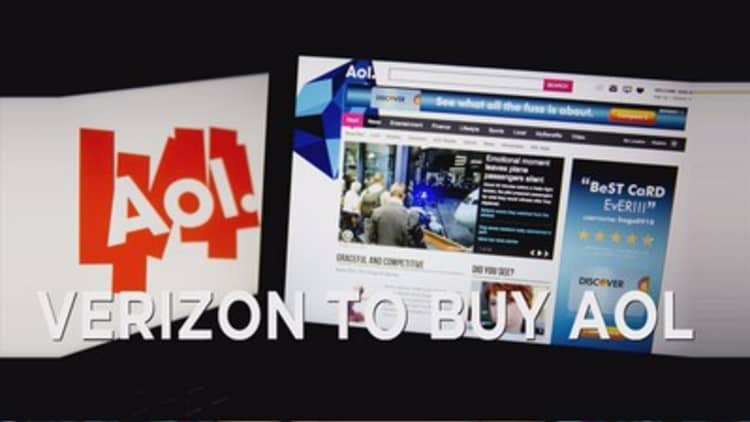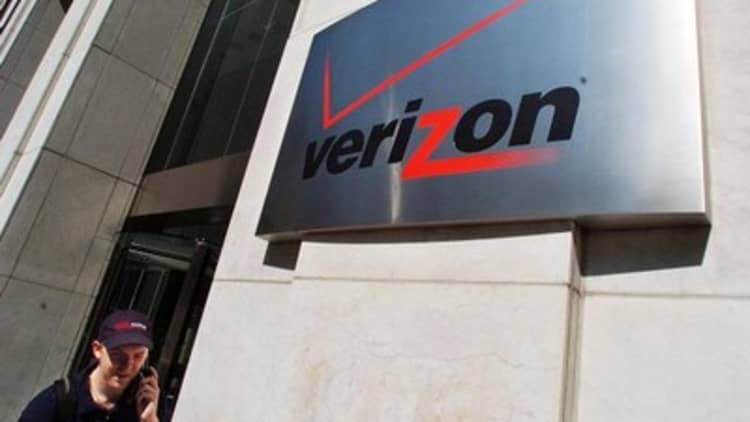



AOL decided to sell to Verizon in order to compete in a future marketplace dominated by larger players, CEO and Chairman Tim Armstrong told CNBC on Tuesday.
"If you look at AOL over the last five years ... we turned the company around. We outperformed the S&P 500 for the last five years, and when you look at where we are today and where we're going, we've made AOL as big as it can possibly be in today's landscape," he said in a "Squawk Box" interview. "But if you look forward five years, you're going to be in a space where there are going to be massive, global-scale networks, and there's no better partner for us to go forward with than Verizon."
Armstrong spoke after Verizon announced it had reached an agreement to acquire AOL for $50 a share in a deal valued at about $4.4 billion. The telecommunications giant said in a statement the acquisition would further its strategy to build out its LTE wireless video and streaming video strategy.
Read MoreVerizon to buy AOL for $4.4 billion
The company also said AOL would contribute to its Internet of Things platform, a technology that helps Web-enabled devices communicate and coordinate with one another.
Asked why AOL choose not to pursue growth by acquiring smaller companies, Armstrong said the Verizon deal was the biggest, fastest way to provide a return to AOL's shareholders and a bright future to its employees.
He also said the shift toward mobile content and streaming video delivered beyond traditional cable—known as over-the-top service—means there are fewer seats at the table for companies in AOL's sector.
"There is absolutely no doubt in my mind that there are 40, 50 companies chasing 10 seats or so—seven to 15 seats available," he said. "So this is a chance for us basically to pull up a chair with Verizon at the table."
Shares of AOL closed at $42.59 on Monday. The stock was trading about more than 18 percent higher in premarket trading. (See what the shares are doing now.) Verizon stock was down less than 1 percent.
Armstrong will continue to lead AOL operations once the deal closes. He told CNBC he will stay with the company for "a long period of time."
He said he was not able to discuss specifics until he joined Verizon formally, but noted the telecom has 1.5 billion connected devices in the United States and touches 70 percent of U.S. Internet traffic.
"If you look at what they're able to do from a value-add services standpoint, I think they're going to put more high-quality premium video, more high-quality advertising and commerce, and then the Internet of Things is going to hit, and I think you're going to see companies like Verizon be in a very good position for the future," he said.
Read MoreTimeline: AOL through the years
He said he expected consumers to have a "much deeper relationship with Verizon."
"I think there's a larger strategy at Verizon, which has really been centered around really making the connection from the home to the phone to the car very easy for content and services," he said.
In addition to operating content websites including the Huffington Post and TechCrunch, AOL has significantly grown its advertising business, which has boomed on the back of its automated ad purchase platform.
Revenue in AOL's ad platform business rose 21 percent to $279.8 million in its most recent financial quarter, accounting for 45 percent of total revenue. Ad sales across AOL's brands grew 8 percent as a surge in search ads more than offset continued weakness in display ads.
Armstrong said partnering with Verizon could amplify its ad business at a time when better analytics are helping advertisement platforms such as AOL's reach more consumers with more timely messages.
"I think you're going to see things like private marketplaces and programmatic [ads] basically make mobile shine, and I'm hoping the shiniest company in the mobile space is going to be the combination of Verizon and AOL," he said.
Read MoreAOL is acing advertising's shift to mobile: CEO Tim Armstrong
AOL did not pursue an auction once approached by Verizon, Armstrong told CNBC, saying he met with Verizon CEO Lowell McAdam last summer at Allen & Company's Sun Valley media finance conference to review its partnership and discuss the direction of the industry.
"That sort of kicked off a natural progression to where we are today," he said. "If you look at the two visions of the companies and the platforms and what this deal is about, both companies were doing the same thing."
—Reuters contributed to this story.


